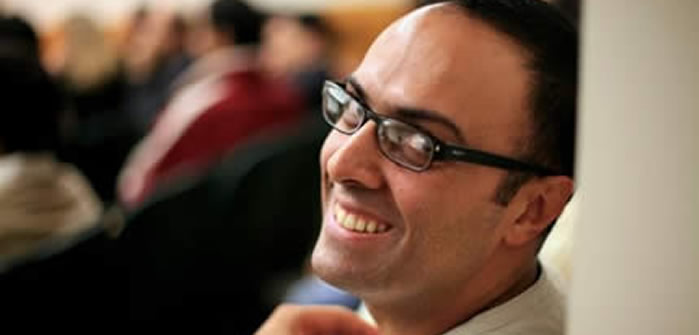Ahmad Kiarostami has worked in cinema and software industries for twenty years. After taking on leadership roles at Microsoft Middle East, he founded three companies including the first multimedia and online production venue in Iran, where he published award-winning multimedia products in cinema and visual arts. Ahmad was a member of several national software standard committees, and developed the first full-text search technology for Persian content which was adopted by different products and online newspapers. This technology is used in his personal project, Persopedia, one of the first and biggest online libraries on Persian poetry.Ahmad has made short films and has worked with Iranian directors including Bahram Beyzaie, Nasser Taghvaie, and Ramin Bahrani. He has also served on the board of San Francisco Cinematheque, the oldest organization in North America promoting independent and experimental cinema and video. His music video for Kiosk’s song, Eshgh-e Sor’at, is among the most viewed Iranian music videos on YouTube.
Ahmad has studied Math and Computer Science at Sharif University and Philosophy at UCLA. He is currently working on his new startup, Fotomoto, in San Francisco, California.
BT: How did you start making films? And here comes an inevitable question that you may not like: What has been the effects of having a world known filmmaker as father?Bijan Tehrani: Can one say that you are a “mood” filmmaker? In your music videos like the one I love, “What About Love“(Ey Dad Az Eshgh) you are creating a mood, you are visualizing an emotion or sentiment.
Ahmad Kiarostami: I’ve done only 4 music videos (of which only 2 are available on the net), and I don’t think that qualifies me as a “filmmaker”. But in those videos, especially in “What about love”,
I did try to create a mood, or maybe I should say, I tried to show *my* mood. If I want to explain using your term, mood, I would say “Love for Speed” has a social mood, and it seems that more people connected to that one. But “What about love” has a very personal mood, which by nature, has a much more limited audience. I’m very happy to know you’re one of them.
AK: Well, no matter what, I always get that “inevitable question”! For years, the question was “how come you didn’t become a filmmaker?”, and now it’s “how did it effect…”! Well, it’s true, my father is a filmmaker, and I grew up watching him make films, and I’m sure I’ve absorbed a lot through the years. When I was a teenager, I tried cinema, but never worked with my father, I worked with some other well-known directors in Iran, like Bahram Beizayi, Nasser Taghvayi, and Kioomars Pourahmad. After I finished high-school, I decided that I wanted to try my own thing, and I chose engineering/computers. That’s what I’ve been doing since then. But all these years, I’ve had an “itch”. That itch made me do different things, from trying to co-direct, to produce, to being on the board of cinema-related organizations. But none of them was really my thing. It was either missing the creative part, or was too big to be an on-the-side project. I also made few short films, 2 or 3 of them, but now this music video thing seems to be a lot more fun. I’m sure you can trace the “effects of my father” in my videos, but it’s not limited to that. You can also find that “effect” in the words I use when I talk, or the way I put my hand on the back of my head when I sit. Whenever I go to Vancouver to see my uncle there, rarely an hour passes without him saying “its amazing, you sounds just like Abbas”. It’s always entertaining for people to find similarities, from George Bush Sr. and Jr., to the father and son who run their local grocery store. It’s like the game we used to play when we were kids, the one that asks to find similar items in different pictures.
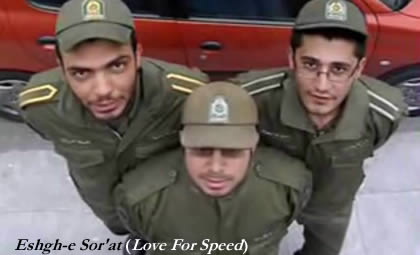 BT: You told me you are a computer software engineer, how did you end up with that kind of education? Is that really your passion? How can an engineer and an artist live together inside you?
BT: You told me you are a computer software engineer, how did you end up with that kind of education? Is that really your passion? How can an engineer and an artist live together inside you?
AK: It just happened, I guess! In Iran, if you can go to an engineering or medical school, you have no choice other than studying engineering or medicine, even if you want to become an artist. Several of my artist friends are like that. for example Payman Yazdanian who is one of the best piano players in Iran and also a very good music composer, studied Industrial engineering at one of the best engineering schools in Iran. Just like Payman, I went to an engineering school, but unlike Payman, there I sadly realized that I’m an engineer and that’s what I’m good at. Then I tried to mix both, I started the very first multimedia company in Iran, but I was still an engineer. I like to experience art, I sometimes write little “notes” (I recently put them in a blog), I do a little graphics, design logos, and make music videos, but these are all hobbies. I don’t mistake trying art with being an artist.
BT: When did you move to the US and how did you face the changes? Did you know the US through cinema and literature?
AK: I came to the US in 2001 just to visit. Those days computer engineers were still in demand, and I got a job offer without applying for one, but I didn’t accept it. After traveling for a month from the west coast to the east coast, I thought I should try living here. The job offer was still there, so I got it and changed my visa from visiting to working and I stayed here. I got my working permission on September 1st 2001, and 10 days later everything changed. All I can say is I was lucky, both with the offer, and the timing.
I kind of knew the US when I got here, but not only through cinema and literature. Roman Gary in “Goodbye Gary Cooper” says “America is a country that everybody knows without being there, because everything there from A to Z is exportable: you can find America in any supermarket”, which – in an ironic way – is true. From Hollywood, to Microsoft, to Michael Jackson, to Levi’s, to Mc Donald’s, I knew it all. But when I came here, I realized the reality here was a little different from the image I saw in Bay Watch.
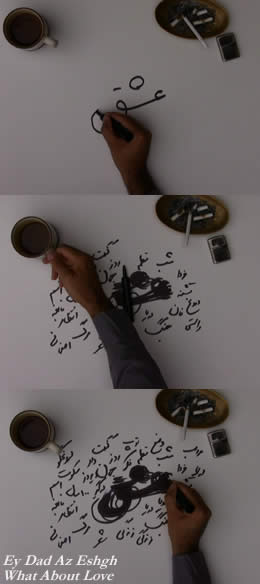 BT: Your work as a filmmaker has close ties with Farsi as a language and even a form. I am sure any film fan who could discover your work and find the means of understanding it, will enjoy it. But is there any English translation of the lyrics of your video musics? Or are you planing to work on any English language songs?
BT: Your work as a filmmaker has close ties with Farsi as a language and even a form. I am sure any film fan who could discover your work and find the means of understanding it, will enjoy it. But is there any English translation of the lyrics of your video musics? Or are you planing to work on any English language songs?
AK: There’s a subtitled version of “Love for Speed” on the net, but I think if not impossible, it’s very difficult to put subtitles for “What about love“. The idea of that video is very simple, and I have tried to explain it to a couple of non-Farsi-speaking friends. They all seemed like they got it, but it’s like translating a joke, most of the time, you can only translate the words, not the humor, you can’t really explain a joke. The third video (which is not on the net) is in Farsi as well, with English subtitles. The last one, which will be on the net in a couple of months, is for an English song, but again for a “Persian” audience, so you still have to be Iranian to “get” it. I’d love to make a video for an English song, but it hasn’t happened yet. Do you know of a good musician that wants a music video?
BT: What type of music do you like most? And if you were given the opportunity to make a music video for the English song of your choice, what song it would be and how do you approach it visually?
AK: Well, my music taste changes from time to time. During the 80’s I was a teenager, so I have a lot of emotional attachment to 80’s music, even though I think it’s crap! And you can’t belong to my generation in Iran and not like rock, especially Pink Floyd. Through Pink Floyd’s music we could see and express our anger, frustration, and confusion. You know that western music in Iran was illegal and there was no “official” place to buy that music from. You could only get that type of music from underground vendors, but the quality of the copies was usually very poor, and sometimes they would give you Wasp instead of Wham! So each time a friend or a family member was going out of the country, or was coming back to visit, I’d ask them to bring me a cassette or later a CD. That way I gathered more than 1000 CDs, which I was very proud of. You could find everything there, Leonard Cohen (I still adore this man), Sting, Tom Waits, Charles Lloyd, Julian Bream, Paris Combo, Ben Harper, Schubert, Alizadeh, Arvo Part. As I’m getting older, I appreciate jazz more and more, but I also bought my first rap music yesterday! The only type of music that I can’t stand is country!
But choosing an English song to make a video for is not only based on my music taste. So far, the video’s that I’ve made are based on how they makes me feel. Technically they are very simple. That doesn’t mean I don’t like to use technology. Some of the best music videos that I’ve seen are Peter Gabriel’s videos, and he uses a lot of technology there. But technology is there to help enhance a feeling, not create a feeling. I’ve been thinking (daydreaming) about making a music video for Tom Wait’s “Road to Peace” for a while now. I imagine that video having a lot of visual effects, but all in a very realistic way. Imagine something like Forest Gump. I know perfectly well this is only a dream, it’s Tom Waits after all, and it would be an expensive project, but there’s no harm in dreaming. I also have an idea for Clare Fader’s “The Wine” which seems closer to the reality, but still far from happening!
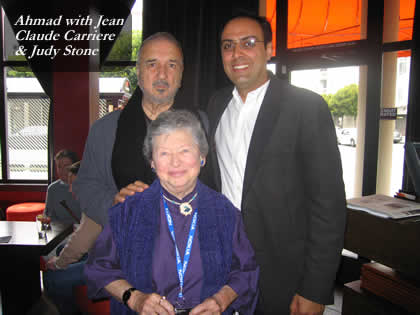 BT: Do you watch a lot of MTV and other music channels? What have been your favorites music videos?
BT: Do you watch a lot of MTV and other music channels? What have been your favorites music videos?
AK: I don’t. MTV changed the music video seen when it came out, but is not about music anymore. I don’t like TV in general, and I don’t watch much TV. I try to see music videos online, and on DVD. Like I said, I love some of Peter Gabriel’s music videos, like “Sledgehammer“, and “Big Time“. U2’s “Numb” is just fantastic. I love the simplicity of Bob Dylan’s “Subterranean Homesick Blues“, and when several people compared my “Ey Dad az Eshgh” to that I thought I couldn’t get a better complement. I have watched Sinead O’Connor’s “Nothing Compares 2 U” many times. Van Halen’s “Right Now” is unforgettable. Fatboy Slim’s “Weapon of Choice” (by Spike Jonze) is hilarious. And I think Michel Gondry is the Einstein of music-video-makers, and his visually genius mind easily covers the lack of feeling in his music videos. I still haven’t been able to figure out how he’s imagined “Let Forever Be“, and how he’s made “Sugar-Water“. (I met him few months ago and asked him about this, and he said he made the whole thing in less than a week). And I stole the opening of Police’s “Wrapped around your finger” and used it in “Zoghal Khoob” (which I never published on the net).
BT: How do these videos affected your work?
AK: Let me say something here. I have a theory that some people don’t like: I think we are getting to the end of many different forms of art. For example, I think painting is finished, over. Doesn’t matter what you want to do with your paper/pencil/canvas/paint, it’s been done before. You can’t do anything new. Cinema and video are relatively newer forms of art, so there’s still some room left for creativity there, but with the speed we’re moving at, we’re going to pass the finish line soon. In this type of situation, whatever you do, you will be imitating someone. After I made “Eshgh-e Sorat” several people told me I copied Nickleback’s “Rock Star“. I had not seen that video by then, but that doesn’t change the fact that using people on the street lip-syncing wasn’t new. I saw it the first time more than 15 years ago in “One World, One Voice“.
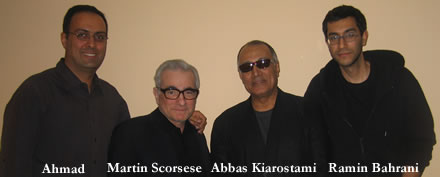 I think these days only exceptional, genius people – like Michel Gondry – can make something totally new. The rest of us can only imitate the others. But if we are clever, we can hopefully add something – even a little something – to the original works. Martin Scorsese was once talking about making “Raging Bull“, and how in the fight scene, he used the famous bath scene from Hitchcock’s “Psycho” (and I think he has added A LOT to that scene!).
I think these days only exceptional, genius people – like Michel Gondry – can make something totally new. The rest of us can only imitate the others. But if we are clever, we can hopefully add something – even a little something – to the original works. Martin Scorsese was once talking about making “Raging Bull“, and how in the fight scene, he used the famous bath scene from Hitchcock’s “Psycho” (and I think he has added A LOT to that scene!).
BT: YouTube is where creations of filmmakers like yourself find a chance to reach an audience. How important has YouTube been for recognition of your work?
AK: YouTube and Internet have totally changed the game. You don’t need big companies to promote and distribute your work anymore, and that’s great. Without YouTube, it would have been impossible for me to show my video. Like I said, this video is just a hobby for me, and I can’t imagine myself putting a lot of effort in showing my work. The other great thing about it is you can directly see what people say about your work, and get feedback immediately after you release a video.
But at the same time it has it’s own problems. The first thing is because it’s very easy to make videos and distribute them, there are a lot of bad videos out there. It’s just like when CGI (Computer Generated Imagery) came out. Because the tools were there people with no graphic or advertising talent started make commercials and as a result there were a lot of bad CGI ads on TV. people don’t have anything to say, but because it’s easy and “fun”, they make videos. Technology and tool is replacing form, and what has been forgotten is content. And it becoming more and more difficult to make money from video or even film. Since I don’t pay my bills with my videos, I don’t really have this problem, but I see several friends in cinema facing financial problems. The whole business model of film, video, and music is going through a big change, and I’m sure in few years we will see a very different situation.
BT: Have you seen any of the Beatles movies like Yellow Submarine? Do you have the same problems with them that you have with Hollywood musicals? Also have you seen Carlos Saura’s Carmen?BT: What is your take on musical films? Do you see yourself making a musical feature film?
AK: Like I said, I don’t see myself as a filmmaker, but honestly, even as film-watcher, I never understood musical films! It’s exactly the opposite of the direction I would like to go… In the videos I did for Kiosk, I tried to turn a song into something bigger, add another dimension to it, and make it more universal. For example “Ey Dad Az Eshgh” was from their old album, and was a nice love song. In my video, I drew the word “Love” beautifully in the middle, and then added all those words around it. The more I repeat love, the messier it gets. That image in the end, with a big messy love in the middle and all those things around it, is the image of life. Everything in that video is personal, simple, and at the same time, very cliche, just like our lives. I tried to turn that song from a simple love song to a song about life. Now, I don’t claim that I was successful in doing this, not at all. But that’s what I liked and tried to do. Musicals are exactly the opposite. In the best form, they get a real topic and ruin it by adding dancing and songs to it, and making it “entertaining” and “fun”. The only musical that I liked in my whole life was “West-side story”, and even there I wonder if I liked the film because I was 14 when I saw it! I don’t want to see it again, because I’m afraid I won’t like it again!
AK: It’s interesting, now that you’re mentioning these movies I can see that I don’t have the same issues with them, and I don’t know why! I think I should rethink what I said about musicals! Yellow Submarine is more like a long music video. And Carlos Saura’s Carmen… I don’t know what to say,
it has all the elements that I dislike in musicals, but I love that film. I enjoy almost anything by Saura. In Iberia there’s a dance scene with plastic blowing on the dancer’s face and body, which is just amazing!
BT: Do you like any of the documentaries made about music? They might not have some of the same problems that you have with musicals. Have you ever thought about making documentaries about music?
AK: Documentaries are exactly the opposite of what I said about musicals, and as I get older I like documentaries even more. With Hollywood movies getting more and more boring, and independent cinema facing more production and distribution problems, documentaries are becoming one of the best ways to spend time in front of screen! And if it gives me more information about the people whose music I like, it’s even more interesting! No Direction Home was about someone that I admire in music, made by someone that I admire in movies. And it was fun to see the young Roger Waters and David Gilmour between the tracks in the recent release of Pink Floyd DVDs. Koyaanisqatsi and Baraka were not exactly documentaries, but I enjoyed the them very much. I’m not a filmmaker, but I’m sure I’d enjoy hanging out with musicians and filming them.
In the time elapsed between the interview and its publication, Ahmad has made 2 music videos, one of which (for a French band “Dilem“) is available online, and you can see it above.

